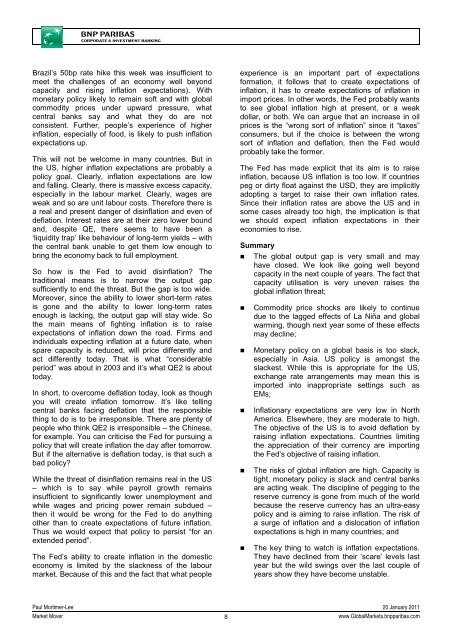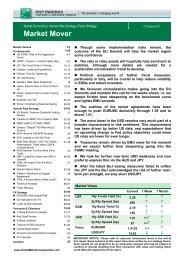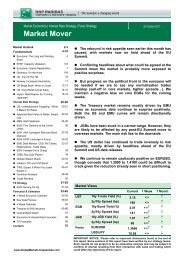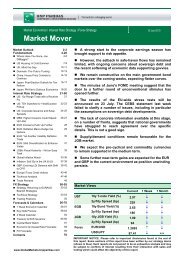Market Economics | Interest Rate Strategy - BNP PARIBAS ...
Market Economics | Interest Rate Strategy - BNP PARIBAS ...
Market Economics | Interest Rate Strategy - BNP PARIBAS ...
Create successful ePaper yourself
Turn your PDF publications into a flip-book with our unique Google optimized e-Paper software.
Brazil’s 50bp rate hike this week was insufficient to<br />
meet the challenges of an economy well beyond<br />
capacity and rising inflation expectations). With<br />
monetary policy likely to remain soft and with global<br />
commodity prices under upward pressure, what<br />
central banks say and what they do are not<br />
consistent. Further, people’s experience of higher<br />
inflation, especially of food, is likely to push inflation<br />
expectations up.<br />
This will not be welcome in many countries. But in<br />
the US, higher inflation expectations are probably a<br />
policy goal. Clearly, inflation expectations are low<br />
and falling. Clearly, there is massive excess capacity,<br />
especially in the labour market. Clearly, wages are<br />
weak and so are unit labour costs. Therefore there is<br />
a real and present danger of disinflation and even of<br />
deflation. <strong>Interest</strong> rates are at their zero lower bound<br />
and, despite QE, there seems to have been a<br />
‘liquidity trap’ like behaviour of long-term yields – with<br />
the central bank unable to get them low enough to<br />
bring the economy back to full employment.<br />
So how is the Fed to avoid disinflation? The<br />
traditional means is to narrow the output gap<br />
sufficiently to end the threat. But the gap is too wide.<br />
Moreover, since the ability to lower short-term rates<br />
is gone and the ability to lower long-term rates<br />
enough is lacking, the output gap will stay wide. So<br />
the main means of fighting inflation is to raise<br />
expectations of inflation down the road. Firms and<br />
individuals expecting inflation at a future date, when<br />
spare capacity is reduced, will price differently and<br />
act differently today. That is what “considerable<br />
period” was about in 2003 and it’s what QE2 is about<br />
today.<br />
In short, to overcome deflation today, look as though<br />
you will create inflation tomorrow. It’s like telling<br />
central banks facing deflation that the responsible<br />
thing to do is to be irresponsible. There are plenty of<br />
people who think QE2 is irresponsible – the Chinese,<br />
for example. You can criticise the Fed for pursuing a<br />
policy that will create inflation the day after tomorrow.<br />
But if the alternative is deflation today, is that such a<br />
bad policy?<br />
While the threat of disinflation remains real in the US<br />
– which is to say while payroll growth remains<br />
insufficient to significantly lower unemployment and<br />
while wages and pricing power remain subdued –<br />
then it would be wrong for the Fed to do anything<br />
other than to create expectations of future inflation.<br />
Thus we would expect that policy to persist “for an<br />
extended period”.<br />
The Fed’s ability to create inflation in the domestic<br />
economy is limited by the slackness of the labour<br />
market. Because of this and the fact that what people<br />
experience is an important part of expectations<br />
formation, it follows that to create expectations of<br />
inflation, it has to create expectations of inflation in<br />
import prices. In other words, the Fed probably wants<br />
to see global inflation high at present, or a weak<br />
dollar, or both. We can argue that an increase in oil<br />
prices is the “wrong sort of inflation” since it “taxes”<br />
consumers, but if the choice is between the wrong<br />
sort of inflation and deflation, then the Fed would<br />
probably take the former.<br />
The Fed has made explicit that its aim is to raise<br />
inflation, because US inflation is too low. If countries<br />
peg or dirty float against the USD, they are implicitly<br />
adopting a target to raise their own inflation rates.<br />
Since their inflation rates are above the US and in<br />
some cases already too high, the implication is that<br />
we should expect inflation expectations in their<br />
economies to rise.<br />
Summary<br />
• The global output gap is very small and may<br />
have closed. We look like going well beyond<br />
capacity in the next couple of years. The fact that<br />
capacity utilisation is very uneven raises the<br />
global inflation threat;<br />
• Commodity price shocks are likely to continue<br />
due to the lagged effects of La Niña and global<br />
warming, though next year some of these effects<br />
may decline;<br />
• Monetary policy on a global basis is too slack,<br />
especially in Asia. US policy is amongst the<br />
slackest. While this is appropriate for the US,<br />
exchange rate arrangements may mean this is<br />
imported into inappropriate settings such as<br />
EMs;<br />
• Inflationary expectations are very low in North<br />
America. Elsewhere, they are moderate to high.<br />
The objective of the US is to avoid deflation by<br />
raising inflation expectations. Countries limiting<br />
the appreciation of their currency are importing<br />
the Fed’s objective of raising inflation.<br />
• The risks of global inflation are high. Capacity is<br />
tight, monetary policy is slack and central banks<br />
are acting weak. The discipline of pegging to the<br />
reserve currency is gone from much of the world<br />
because the reserve currency has an ultra-easy<br />
policy and is aiming to raise inflation. The risk of<br />
a surge of inflation and a dislocation of inflation<br />
expectations is high in many countries; and<br />
• The key thing to watch is inflation expectations.<br />
They have declined from their ‘scare’ levels last<br />
year but the wild swings over the last couple of<br />
years show they have become unstable.<br />
Paul Mortimer-Lee 20 January 2011<br />
<strong>Market</strong> Mover<br />
8<br />
www.Global<strong>Market</strong>s.bnpparibas.com

















